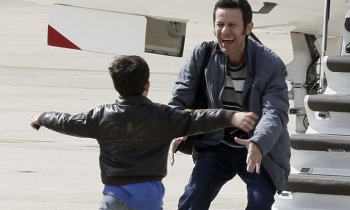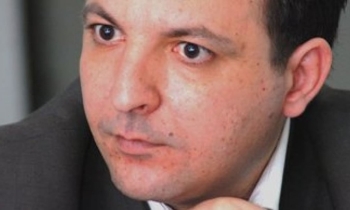SAFED, Israel -- The air-raid alarm sounded just as I turned into Safed.
An ancient city high in the hills of the Galilee region, Safed has been known since the Spanish Inquisition as a refuge of Jewish mystics, but more recently as a prime target of Hezbollah rockets. It has been hit repeatedly, and broad black circles where the rockets exploded and burned have scarred the hillsides.
I drove into an industrial zone overlooking the Jordan River Valley, strapped on a heavy helmet, and hopped out with a pair of binoculars to take a look. I started to scan the broad valley, but all I saw was black.
I pulled the glasses aside and saw a billowing cloud of smoke right in front of me. In the same instant, I heard the explosion. A Hezbollah rocket had hit 100 to 150 yards away.
In seconds, I was on the ground, wriggling into a protective vest reinforced with ceramic plates.
Usually, getting into the heavy vest takes much time and effort, and you have to be standing to get it on.
It's amazing what you can do when circumstances demand it.
BOOM! A second rocket crashed down a little closer.
By the time the third rocket hit, I was in the vest, in the car, and racing downhill with camera in hand.
But there was not much to photograph and no one to interview: The rockets -- three of more than 200 that rained down on northern Israel on Thursday -- set off more fires in the grass and trees.
But somehow I felt I was not alone. I looked up at the apartment blocks overlooking the road. In every window, faces stared there at the places where the rockets struck, and at the guy running around with the camera.
Then the air-raid siren wailed again; I rushed into the car with vest still on -- no small or comfortable feat -- and got out of there fast.
But these days there is no easy escape.
With vest and helmet stowed away, I drove along the old Northern Road, a winding two-lane strip of asphalt parallel to the Lebanese border that used to offer a pleasant drive through rolling hills and small mountains.
Now the pavement has been ground to gravel by Israeli tank treads. Rockets and mortar shells can fall anywhere at any time.
Outside the towns, it's hard to hear any sirens. The first warning of another attack was a plume of smoke rising 400 or 500 yards away. Then came the noise of the explosion; I drove a couple hundred yards and a second plume went up, closer this time, and another loud explosion shook the air.
I stopped, donned vest and helmet again, and drove on. Then came the full barrage.
This time, I heard the whistle of incoming Hezbollah mortar rounds from Lebanon, rather than rockets. Seven or eight came in, one after another, the impact from each explosion rocking the car.
Then it was over. I took a deep breath and listened. For a minute, it was deadly quiet. And then life went on.









